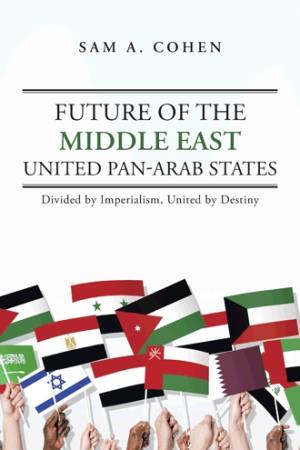Future of the Middle East - United Pan-Arab States
Divided by Imperialism, United by Destiny
Cohen says he’s found who’s responsible for conflict in the Middle East.
Sam Cohen’s lengthy work, Future of the Middle East—United Pan-Arab States, seeks to illuminate favorable developments in the Middle East and to project a future sans foreign domination, with particular focus on the absence of Israel. While the book does offer some uncommon perspectives on the region, its disproportionate focus on Jews ends up undermining its delivery.
The early portions of Cohen’s book attempt to dismantle what he views as misconceptions related to the Middle East, Arabs, and Islam. He asserts that Sunni and Shiite divisions have never been as pronounced as purported, and insists that the Arab Spring was far more successful than Western media suggest.
Arab cultures and Middle Eastern nations are covered in brief, mostly on a case-by-case basis. These presentations tend to be anecdotal, including rumors of Saudi Arabian dwarf-tossing, and do little to clarify Cohen’s Arab vs. Muslim distinctions. Such obfuscation ends up being less of a frustration than does the work’s turn toward a screed, however.
While the title suggests projections regarding Pan-Arab statehood, these wind up being confined to a six-page chapter. The bulk of the work instead focuses on the evils of Israel, the United States, and world Jewry, whom Cohen says collude to keep the Middle East unsettled and the world at constant war.
While the United States is decried as the most vicious imperialist nation in world history, most of Cohen’s ire goes toward Jews. Among other typical anti-Semitic charges, he calls Israelis and Jews hard-hearted to the point of inhumanity, voracious chasers of wealth, and power-hungry, all while denying that anti-Semitism is a persistent problem.
The specter of media and governments controlled by Jews is raised, with Cohen working to out quarter-Jews and half-Jews influential in the initiation of Middle Eastern conflicts. Nineteen are credited with the United States’ involvement in Afghanistan and Iraq, ranging from columnists to a low-ranking senator.
These notions of Jewish conspiracy permeate discussions of world affairs within the book, and it’s uncertain that Cohen’s chapters stand to persuade anyone not already convinced of the insidiousness of Jewish statehood and the virtue of Palestinian suicide bombings. The Pan-Arab statehood he envisions doesn’t include room for the nation he devotes most of his book to disparaging, except maybe for Israeli refugees; the nation itself, he says, serves only the purpose of any virulent enemy, and ought to be scrubbed.
Grammatical mistakes, faulty punctuation, misspellings, and malapropisms pepper the text. Perusals of Cohen’s lengthy bibliographies betray a reliance on editorials from fringe sources and partisan writers like Max Blumenthal, while simultaneously belying his assertions that Western media won’t critique Israel—The New York Times criticisms factor in heavily.
All in all, readers simply don’t learn much about the Middle East and its future from this work, which propagandizes with as much fury as it accuses its declared “enemies” of doing. Cohen may be convinced that Jews have the corner on “sawing” discord, but his work, which does little else, does nothing to correct that course.
Reviewed by
Michelle Anne Schingler
Disclosure: This article is not an endorsement, but a review. The publisher of this book provided free copies of the book and paid a small fee to have their book reviewed by a professional reviewer. Foreword Reviews and Clarion Reviews make no guarantee that the publisher will receive a positive review. Foreword Magazine, Inc. is disclosing this in accordance with the Federal Trade Commission’s 16 CFR, Part 255.

